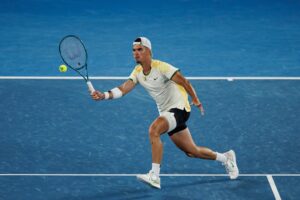With his win over Roger Federer, John Millman gave birth to a hysteria, a.k.a #Millmania, that’s taken over the tennis world. But, let’s be clear on one aspect of the sport–it’s natural for players to lose more frequently when they’re older than when they are at their peak. And as far as tennis players are concerned, nearing forty years of age isn’t the scenario they’d like to be in. Federer’s loss to Millman at the US Open isn’t anything unnatural. Federer is 37. It’s likely that he’ll have up-and-down performances, now more than ever.
Getting older and its side-effects
This year’s US Open is one of the hottest and most humid in its history. A 10-minute break after the 3rd set in men’s matches and after the 2nd in women’s, girls’, and boys’ matches are allowed if either player wants them. And they have agreed to take the necessary breaks. In spite of that, we saw an absurdly high number of early-round withdrawals happened and understandably so. Someone as adept in adapting to extreme conditions as Novak Djokovic had to take medical time-outs to be able to properly compete. It’s not surprising that Federer felt the heat get to him in crunch moments. In the post-match press conference, Federer confirmed the same.
Getting older has its pros and cons–across all sports. But, in tennis and other individual sports, coping with age-related cons is a lot harder than team sports. When they enter the arena to fight for relevance, they’re out there on their own and with every wrong step they take, seeds of self-doubt are sown. At one changeover during his match against Millman, Federer cut a sorry figure with his shoulders drooped. He looked disappointed. Almost apologetic that he couldn’t physically cope with the extreme conditions like he would have had he been younger. That, and the fact that his game completely deserted himself when he needed it the most.
The great Jimmy Connors once said, “Experience is a great advantage. The problem is that when you get the experience, you’re too damned old to do anything about it.” It doesn’t entirely hold true for Federer, who has won Grand Slams past 35 years of age, but on days like these, the effect is pretty apparent! This is quite common for the older players, with their game MIA. Federer isn’t the first player to fall prey to it, nor will he be the last.
Federer’s worsening record at US Open
Roger Federer won the US Open five times consecutively from 2004 to 2008. In the next nine editions that he participated in, he reached the final just twice, losing both times. In his seven other appearahces, he made the semifinals thrice, quarterfinals twice, and round of 16 twice. Over the last few years, the US Open has almost exclusively been the Grand Slam of uncertainty and unpredictability. All of the active men’s Grand Slam holders have triumphed in New York, which is not the case with any other Major. Since 2009, Federer hasn’t been able to bring his A-game to the table when needed, either. More often than not, he’s failed to turn up in the crucial moments of the tournament. John Millman made full use of the opportunities he got and showed Federer the exit door.
Federer served 10 double faults and hit a total of 77 unforced errors in the three-and-a-half hour match. As it happens with most players, on a bad day, they just don’t seem to execute the correct tactic when required. Their opponents stay calm throughout and play with intent, imposing themselves and outlasting in the rallies. Millman was no different. He applied himself incredibly well to force errors off Federer’s racket and earn the biggest win of his career.
There’s no way to pinpoint one particular reason behind Federer’s string of losses in New York. But in hindsight, it could be the demons of US Open following his 5th title in 2008 that have been chasing him ever since. He led a relatively inexperienced Del Potro two sets to one in 2009 final, coming close to a 4-set victory. But he was denied and went on to lose the decider 2-6. In 2010 and 2011, he served for the match in the semifinals against Novak Djokovic. Both times, he held match points that he squandered. He couldn’t recover from the heavy blows.
Perhaps these string of losses in three successive editions led to his inevitable downfall (by his lofty standards) at the US Open. While many fans might think of this loss as a sign of the things to come, it’s probably a little early to dread for the future. Roger Federer is human. Age is catching up to him and he’s understandably getting older by the day. But, his weirdest failures always come at US Open. And he performed just fine, shaking off those losses in the subsequent tournaments. It’ll be a bit premature to think his time is up based on one performance. Older players tend to have a frequent mix-up of good days and bad days. You never know which version of them will show up. Roger Federer might not be a heavy favorite from now on, but he’ll still be good enough to be a worthy title contender every time he takes the court.






